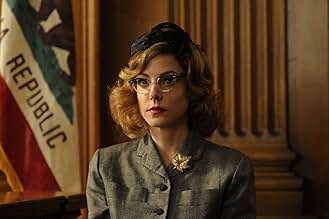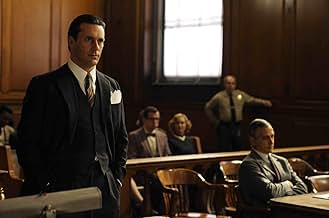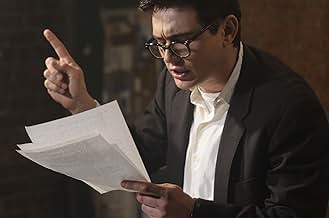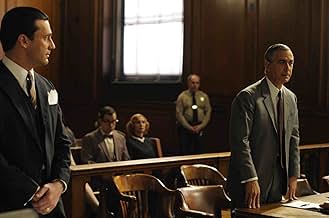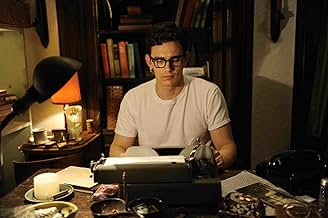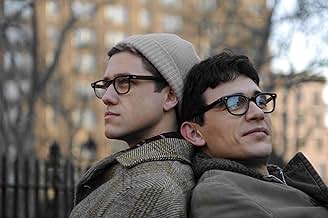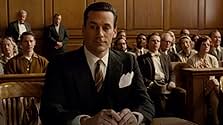ÉVALUATION IMDb
6,6/10
14 k
MA NOTE
Ajouter une intrigue dans votre langueAs Allen Ginsberg talks about his life and art, his most famous poem is illustrated in animation while the obscenity trial of the work is dramatized.As Allen Ginsberg talks about his life and art, his most famous poem is illustrated in animation while the obscenity trial of the work is dramatized.As Allen Ginsberg talks about his life and art, his most famous poem is illustrated in animation while the obscenity trial of the work is dramatized.
- Directors
- Writers
- Stars
- Prix
- 2 victoires et 8 nominations au total
Kaydence Frank
- Allen's Girlfriend
- (as Kadance Frank)
Allen Ginsberg
- Self
- (archive footage)
Avis en vedette
"I saw the best minds of my generation destroyed by madness, starving hysterical naked, dragging themselves through the Negro streets at dawn looking for an angry fix, angel headed hipsters burning for the ancient heavenly connection to the starry dynamo in the machinery of night
"
So begins the poem "Howl" by Allen Ginsberg who was one of the most respected writers and acclaimed American poets of the so-called Beat Generation of the late 1950s, poets that included Jack Kerouac, William Burroughs, Lawrence Ferlinghetti, Gregory Corso and others. The poem about sex, drugs, politics, and race shocked many people when first published with its explicit language and sexual images and became a cause célèbre leading to an obscenity trial in San Francisco that tested the limits of the First Amendment. According to Ginsberg, reflecting the culture of the fifties, "If you could write about homosexuality, you could write about anything."
Directed by Rob Epstein and Jeffrey Friedman, the film Howl is a celebration not only of the poem but of the artist who, amidst the turbulence that surrounded its initial publication, sought to define his own identity. It is a non-linear work that interweaves a reading of the poem by actor James Franco as Ginsberg with animation by the graphic artist Eric Drooker, a dramatization of the obscenity trial, and an interview with Ginsberg culled from the poet's own words. The film begins with the young Ginsberg reciting "Howl" in a coffeehouse to a young and approving audience. As the poem is being read aloud, the spoken words are animated on screen. Though expertly conceived, the animation creates a literal interpretation of the poem that fails to convey its power and beauty.
According to the poet, he never planned to publish "Howl" because he thought some of the language might offend his father and thus felt free to write anything that came to mind, knowing that no one would ever read it. Consequently, "Howl" delivers a wild torrent of words filled with lines about radical politics, drugs, and homosexuality conveying images that are often erotic and sometimes scatological. The poem may not always be understandable but, especially as read aloud, is filled with a rhythmic pulse that is pure music. The poem describes people who are in love, in pain, and in joy, people who "howled on their knees in the subway and were dragged off the roof waving genitals and manuscripts, who let themselves be f**ked in the a*s by saintly motorcyclists, and screamed with joy, who blew and were blown by those human seraphim, the sailors, caresses of Atlantic and Caribbean love, who balled in the morning in the evenings in rose gardens and the grass of public parks and cemeteries scattering their semen freely to whomever come who may."
The interviews reveal Ginsberg's mental state and how he ended up in a mental hospital, his only way out being to lie to the doctors that he would pursue heterosexuality. His friend in the institute, Carl Solomon to whom the poem is dedicated, however, had no easy way out, having to endure electro-shock therapy and a strait-jacket. Ginsberg's mother, Naomi, was also in a mental hospital for an unknown illness before she died. These troubling personal events in Ginsberg's life are integrated into the film in a way that is very moving although, because most of the poem consists of readings and conversations, the film itself is not very cinematic. One of the strong components is Ginsberg's homosexuality and the film depicts his relationships with Neal Cassidy and Peter Orlovsky with whom he loved and lived with for most of his adult life.
Using actual court transcripts, Howl also dramatizes the courtroom drama with attorneys played by Jon Hamm and David Straithairn arguing the case before the judge (Bob Balaban). Ginsberg himself was not at the trial since it was brought against the City Lights Publishers and Lawrence Ferlinghetti. The witnesses consisted of academics and literary figures either condemning the poem as worthless and without merit or praising it as an innovative and important work of art. The judge in the case eventually determined that the poem had "redeeming social importance," a landmark decision.
Franco's performance captures the energy of Ginsberg's poetry and his feelings about his life and art in the interview but overall fails to convey his warmth and humanity, his spirituality, his playfulness, or his progressive political views. In short, it succeeds in capturing most everything about the artist except the very qualities that make him so inspiring. As the film ends, we see updated information about those mentioned in the film while, in the background, we hear Ginsberg singing "Father Death Blues," a moving ode to the death of his father in a version by the aging poet as he nears the end of his life.
"Father Breath, once more farewell. Birth you gave was no thing ill. My heart is still, as time will tell. Genius Death your art is done. Lover Death your body's gone. Father Death I'm coming home."
Though Allen Ginsberg now home, his art will never be done.
So begins the poem "Howl" by Allen Ginsberg who was one of the most respected writers and acclaimed American poets of the so-called Beat Generation of the late 1950s, poets that included Jack Kerouac, William Burroughs, Lawrence Ferlinghetti, Gregory Corso and others. The poem about sex, drugs, politics, and race shocked many people when first published with its explicit language and sexual images and became a cause célèbre leading to an obscenity trial in San Francisco that tested the limits of the First Amendment. According to Ginsberg, reflecting the culture of the fifties, "If you could write about homosexuality, you could write about anything."
Directed by Rob Epstein and Jeffrey Friedman, the film Howl is a celebration not only of the poem but of the artist who, amidst the turbulence that surrounded its initial publication, sought to define his own identity. It is a non-linear work that interweaves a reading of the poem by actor James Franco as Ginsberg with animation by the graphic artist Eric Drooker, a dramatization of the obscenity trial, and an interview with Ginsberg culled from the poet's own words. The film begins with the young Ginsberg reciting "Howl" in a coffeehouse to a young and approving audience. As the poem is being read aloud, the spoken words are animated on screen. Though expertly conceived, the animation creates a literal interpretation of the poem that fails to convey its power and beauty.
According to the poet, he never planned to publish "Howl" because he thought some of the language might offend his father and thus felt free to write anything that came to mind, knowing that no one would ever read it. Consequently, "Howl" delivers a wild torrent of words filled with lines about radical politics, drugs, and homosexuality conveying images that are often erotic and sometimes scatological. The poem may not always be understandable but, especially as read aloud, is filled with a rhythmic pulse that is pure music. The poem describes people who are in love, in pain, and in joy, people who "howled on their knees in the subway and were dragged off the roof waving genitals and manuscripts, who let themselves be f**ked in the a*s by saintly motorcyclists, and screamed with joy, who blew and were blown by those human seraphim, the sailors, caresses of Atlantic and Caribbean love, who balled in the morning in the evenings in rose gardens and the grass of public parks and cemeteries scattering their semen freely to whomever come who may."
The interviews reveal Ginsberg's mental state and how he ended up in a mental hospital, his only way out being to lie to the doctors that he would pursue heterosexuality. His friend in the institute, Carl Solomon to whom the poem is dedicated, however, had no easy way out, having to endure electro-shock therapy and a strait-jacket. Ginsberg's mother, Naomi, was also in a mental hospital for an unknown illness before she died. These troubling personal events in Ginsberg's life are integrated into the film in a way that is very moving although, because most of the poem consists of readings and conversations, the film itself is not very cinematic. One of the strong components is Ginsberg's homosexuality and the film depicts his relationships with Neal Cassidy and Peter Orlovsky with whom he loved and lived with for most of his adult life.
Using actual court transcripts, Howl also dramatizes the courtroom drama with attorneys played by Jon Hamm and David Straithairn arguing the case before the judge (Bob Balaban). Ginsberg himself was not at the trial since it was brought against the City Lights Publishers and Lawrence Ferlinghetti. The witnesses consisted of academics and literary figures either condemning the poem as worthless and without merit or praising it as an innovative and important work of art. The judge in the case eventually determined that the poem had "redeeming social importance," a landmark decision.
Franco's performance captures the energy of Ginsberg's poetry and his feelings about his life and art in the interview but overall fails to convey his warmth and humanity, his spirituality, his playfulness, or his progressive political views. In short, it succeeds in capturing most everything about the artist except the very qualities that make him so inspiring. As the film ends, we see updated information about those mentioned in the film while, in the background, we hear Ginsberg singing "Father Death Blues," a moving ode to the death of his father in a version by the aging poet as he nears the end of his life.
"Father Breath, once more farewell. Birth you gave was no thing ill. My heart is still, as time will tell. Genius Death your art is done. Lover Death your body's gone. Father Death I'm coming home."
Though Allen Ginsberg now home, his art will never be done.
Howl might be a one-of-a-kind film experience if not for Chicago 10, another film that blended documentary, dramatization and animation together into a blender of personal history. But what sets this film apart from that and all others is that poetry becomes interwoven into a courtroom trial procedural - all, apparently, taken from the actual court transcripts of what the prosecution/defense asked of the people on the stand - so that it becomes about free speech. At the same time it's a quasi-biopic on Allen Ginsberg, who was a real free spirit, but also a shy Jewish kid from New York city who lost his mother as a child and worried about writing poems that might irk the ire of his father (he even considered not publishing Howl for that reason).
It's a beautifully surreal little treat of a film that treats its subject seriously while also giving life to the epic poem that stays timeless, as with Walt Whitman's Leaves of Grass (which also gets name- dropped here). The filmmakers bring together the poetic readings - done by James Franco, one of his real 'embodiment' performances like Saul in Pineapple Express that is basically stunning - from in front of a live audience (where one sees how Ginsberg at first has an audience patient and waiting and then is full of life and looking forward to every next thing he says) and in animation. The poem becomes alive through the low-budget drawings, and depending on the stanza it can be at least acceptable and at most mind-blowing. You almost want the poem to go longer to sink in deeper to those Ginsberg stanzas that flow out with what appears to be stream of consciousness, but really has a structure to it.
Acting is fantastic - David Straithairn, Jon Hamm and in a one-scene keeper Jeff Daniels - Franco keeps things moving so well with his performance, and the poem is given it's best context in personal and social history. All of a sudden, thanks to a film like this, the material becomes alive again, like a student picking it up and sinking into it for the first time.
It's a beautifully surreal little treat of a film that treats its subject seriously while also giving life to the epic poem that stays timeless, as with Walt Whitman's Leaves of Grass (which also gets name- dropped here). The filmmakers bring together the poetic readings - done by James Franco, one of his real 'embodiment' performances like Saul in Pineapple Express that is basically stunning - from in front of a live audience (where one sees how Ginsberg at first has an audience patient and waiting and then is full of life and looking forward to every next thing he says) and in animation. The poem becomes alive through the low-budget drawings, and depending on the stanza it can be at least acceptable and at most mind-blowing. You almost want the poem to go longer to sink in deeper to those Ginsberg stanzas that flow out with what appears to be stream of consciousness, but really has a structure to it.
Acting is fantastic - David Straithairn, Jon Hamm and in a one-scene keeper Jeff Daniels - Franco keeps things moving so well with his performance, and the poem is given it's best context in personal and social history. All of a sudden, thanks to a film like this, the material becomes alive again, like a student picking it up and sinking into it for the first time.
This is a brilliant film. I have not seen a another film that successfully shows how someone creates a work of art, especially a literary work. This film does it brilliantly, largely by quotations from the poem read very effectively by James Franco, who plays Ginsberg. Acted out interviews illuminate many things and the trial itself is extremely involving to watch. Even the animated portions we see while we hear parts of the poem work well. It's a remarkable film about artistic creation and how the artist must be allowed to use his own words and to use language that expresses his meaning fully, not language that is inoffensive to some imaginary reader.
Franco, John Hamm, David Strathairn, Bob Balaban, Jeff Daniels are all at their best, and seem truly committed to the project.
You don't even have to be a fan of Ginsberg, or know much about who he was to enjoy this. I was really impressed, one of the best films of this year, but it will likely be ignored by many.
Franco, John Hamm, David Strathairn, Bob Balaban, Jeff Daniels are all at their best, and seem truly committed to the project.
You don't even have to be a fan of Ginsberg, or know much about who he was to enjoy this. I was really impressed, one of the best films of this year, but it will likely be ignored by many.
Rob Epstein and Jeffrey Friedman's 'Howl' is an interesting and humorous depiction of the 1957 trial regarding Allen Ginsberg's controversial poem 'Howl'. In between the trial we are given glimpses of Ginsberg's life (in black and white) and an interview with him. The black and white sequences are beautifully shot. The style reminds one of French movies from the 50s. The recital of the poems takes some getting used to but once it is coupled with the animated sequence there's no turning back. It brings the poetry to life. Those are the highlights of the film. Moreover the animation is beautifully done. The pacing is uneven as its slow at times (especially in the beginning). I would have liked to have seen more glimpses of Ginsberg's life. The actors do a fairly decent job. James Franco does a good enough job and he is well supported by David Strathairn, Jon Hamm, Bob Balaban, Alessandro Nivola and Mary-Louise Parker. Overall, 'Howl' is an intriguing account and does quite well in introducing Ginsberg's poems to those who are not familiar with his works. The animation gives it a unique touch.
I'm surprised that this film worked as well as it did, and that it has been received as well as it has here. I read Howl about 5 years after Ginsberg wrote it, when I was in high school, and, like it or not, it became part of my thinking in the fifty years since then. Still in high school, I could quote passages from the poem at my friends, who would follow up with the next passage, etc. Boooring. But if you had told me that a film would be made about it, with a script constructed of trial transcripts and interviews in the public record, alternating with a recreation of Ginsberg's first public (paying-public; there was ONE previous reading of the full poem) reading of the poem, I wouldn't have expected much. And I would have been wrong. It's well-done and well-acted, and no excuses are made for anything about Ginsberg or his work. I was dismayed at first to see the poem interpreted into animation, but the filmmakers were savvy enough to produce the animation in the style of the times, i.e., 1955, when Disney's Fantasia was still the state of the art, and the animation in Howl could have come out of the Night on Bald Mountain section. In the end, it worked, I think, by keeping the viewer visually in the world of the poem itself, rather than in the biographical material about Ginsberg or the trial and the litigants. So if you want to watch a movie about a poem, and the poet and his friends, but mainly about the poem, this one does a pretty good job.
Le saviez-vous
- AnecdotesShot in 14 days around New York City in March/April 2009.
- GaffesAbout 29 minutes in, Franco (as Ginsberg) lights up a cigarette. You can clearly see a layer of digital shading (meant to darken Franco's beard) that is overlaid onto his face, esp. his left jaw. This shading also goes over Franco's hand in this scene.
- Citations
Allen Ginsberg: There's no beat generation. It's just a bunch of guys trying to get published.
- ConnexionsFeatured in Late Show with David Letterman: James Franco/Sofia Vergara/Shakira (2010)
- Bandes originalesTonight at the Sands
Written by Jack Arel and Jean-Claude Petit (as Jean-Caude Petit)
ZFC Music (ASCAP)
Courtesy of FirstCom Music
Meilleurs choix
Connectez-vous pour évaluer et surveiller les recommandations personnalisées
- How long is Howl?Propulsé par Alexa
Détails
- Date de sortie
- Pays d’origine
- Site officiel
- Langue
- Aussi connu sous le nom de
- 嚎囂
- Lieux de tournage
- sociétés de production
- Consultez plus de crédits d'entreprise sur IMDbPro
Box-office
- Brut – États-Unis et Canada
- 617 334 $ US
- Fin de semaine d'ouverture – États-Unis et Canada
- 51 185 $ US
- 26 sept. 2010
- Brut – à l'échelle mondiale
- 1 614 810 $ US
- Durée
- 1h 24m(84 min)
- Couleur
- Mixage
- Rapport de forme
- 1.85 : 1
Contribuer à cette page
Suggérer une modification ou ajouter du contenu manquant







